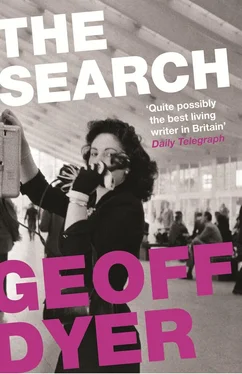Geoff Dyer - The Search
Здесь есть возможность читать онлайн «Geoff Dyer - The Search» весь текст электронной книги совершенно бесплатно (целиком полную версию без сокращений). В некоторых случаях можно слушать аудио, скачать через торрент в формате fb2 и присутствует краткое содержание. Год выпуска: 2013, Издательство: Canongate Books, Жанр: Современная проза, на английском языке. Описание произведения, (предисловие) а так же отзывы посетителей доступны на портале библиотеки ЛибКат.
- Название:The Search
- Автор:
- Издательство:Canongate Books
- Жанр:
- Год:2013
- ISBN:нет данных
- Рейтинг книги:3 / 5. Голосов: 1
-
Избранное:Добавить в избранное
- Отзывы:
-
Ваша оценка:
- 60
- 1
- 2
- 3
- 4
- 5
The Search: краткое содержание, описание и аннотация
Предлагаем к чтению аннотацию, описание, краткое содержание или предисловие (зависит от того, что написал сам автор книги «The Search»). Если вы не нашли необходимую информацию о книге — напишите в комментариях, мы постараемся отыскать её.
The Search — читать онлайн бесплатно полную книгу (весь текст) целиком
Ниже представлен текст книги, разбитый по страницам. Система сохранения места последней прочитанной страницы, позволяет с удобством читать онлайн бесплатно книгу «The Search», без необходимости каждый раз заново искать на чём Вы остановились. Поставьте закладку, и сможете в любой момент перейти на страницу, на которой закончили чтение.
Интервал:
Закладка:
He drifted through the city, tugged by shifting currents of memory, until he found himself outside an old wooden house, painted white. Windows, open shutters. Chimes hanging from the balcony, stroked by a breeze no longer there.
He unlatched the wrought-iron gate and walked round the side of the house. Strewn with leaves, a lawn extended from a conservatory to some flower-beds, bare except for clipped rose bushes. Beyond the flower-beds was a patch of rough ground and a grey-haired man scooping up armfuls of leaves and tossing them on to a bonfire. Walker stood in the middle of the lawn watching him. He appeared lost in thought, pausing in his work and watching the flames, tugging at his right ear-lobe with thumb and forefinger. Thin smoke smudged the sky. The man turned and looked at him, hesitated, and then resumed his work.
Repeating a sequence of events enacted before, Walker passed through the conservatory and into the house. From a ground-floor room he heard a crackly recording of a cello, a woman humming gently in tune with it, the rattle of teacups. He went upstairs and into a small study. Typed pages were scattered over the floor. He looked out of the window and saw an old woman carrying a tray of cups and plates over to a weather-worn table in the garden. The man looked up, saw her, smiled.
Beneath the window was an open roll-top desk. Propped on one side of the desk was an old postcard showing a silent piazza, empty except for a statue and striding shadows. On the back, in his own handwriting, was the name of the city in the picture: Imbria.
CHAPTER FIFTEEN
He travelled there the next day. It was a city of empty piazzas, red towers and the endless perfect arches of arcades. Mustard-coloured walls, ochre streets. He noticed red towers and arcades but mainly he was aware of the space between things, as if there were more space here than was possible. There was no distance or direction, only perspective and white walls, mustard-coloured streets. The city looked the same in every direction — arcades, piazzas, towers, long shadows — but each new view was unfamiliar, strange. Whenever he turned a corner a new but identical vista of arcades and towers opened up before him. Only one sense mattered here. Everything was arranged for the eye.
The sky was turquoise, becoming lighter, greener, close to the pencil-line horizon. The light made the walls of the buildings glow amber. On the other side of the square was the city hall, a tower and clock face that told nothing. Time slid across the piazza in angular shadows. Always it was the shadows, dark as a girl’s hair, that he noticed first. Even a stone in the middle of the piazza cast a shadow the length of a man. Shadows peeked from the edge of a wall and when he turned the corner to see what cast them his attention was held by another shadow, projected from beyond the next corner. Something seemed always to be going on just beyond the edge of his vision, around the next corner. Everything happened in the distance. In this way the city lured him through itself.
Between the mustard walls of a building he caught a glimpse of the sea. He wandered in that direction but did not get any nearer. Space swallowed him up. Shadows slid into the cool arcades. Up ahead was a red tower with flags flying. He turned a corner and there was the sea. Flat, opalescent, lapping gently beyond the low wall. Near the horizon was a triangle of sail, brilliant white. A white cane had been left propped against the wall. A statue gazed out to sea. On the sea-wall was a book, pages flapping in the wind — except there was no wind. Everything was still but the pages were flapping as if in a spring breeze. He moved closer to the book, listened to the rustle of the pages: as if the book were alive, like a creature whose breath had only the strength to make this faint flutter.
Out of the corner of his eye he noticed a shadow emerge from an arcade. A figure stood in the piazza where Walker himself had been standing minutes earlier. They stared at each other, each mirroring the other’s reaction, neither displaying shock or alarm, and then moved on. The sky was an even deeper turquoise than before. Instead of becoming darker, the light had been squeezed, concentrated. Beyond the city was the low swell of Renaissance hills.
Walker was passing by a broken statue when, through the arches of an arcade, he saw the figure again, by the quay where he himself had been standing. Again there was a pause, a lingering surprise, and then they moved on, both looking back once. Later — time was as difficult to judge as distance — it happened again: on this occasion the figure was standing by the broken statue.
Each time they occurred the mood of these encounters changed, imperceptibly, until they were virtually stalking each other round the city. The figure had a similar realization simultaneously, for now he looked at Walker with suspicion. Walker felt the first twinge of unease and the figure’s movements immediately acquired an edge of urgency. Walker began sweating; he had an impulse to run and saw the figure trot across the piazza and disappear from sight.
He continued walking through the bewildered city, uneasy now. He glanced round and saw the figure looking at him. Walker ran across the piazza and into the darkness of an arcade. When he emerged into sunlight the figure was silhouetted, his back to Walker. Immediately, he looked around and ran off. So a pattern was established with Walker alternating between fleeing from the figure who would suddenly appear behind him and surprising this same person who would run from him.
The situation petered out exactly as it had begun. Walker felt confident he could outrace the figure who simultaneously reacted less nervously when Walker came up on him unawares. As their sense of mutual alarm diminished, so did the frequency of these encounters until they spotted each other rarely, harmlessly, at a distance, and Walker resumed his stroll through the city.
Later, lodged in the stone fingers of a statue, he found a card showing the piazza he was now walking across. He pocketed the card and walked on. At the top of a tower a flag fluttered in the absent breeze. In the distance a train steamed silently into the station. A cloud drifted over the train as if it had always been there. The light remained suspended between late afternoon and early evening, the sun never quite setting, the city receding all around.
Walker found himself once again by the quay, the sea lapping green and clear, the statue gazing calmly, the book still lying there, the cane propped by the wall. He picked up the book and leafed through it. On each page, blurred and smudged by spray from the sea, was written the name of one of the cities he had passed through, in the order he had visited them. Imbria was the second last name in the book. The last city, the only one he had not been to, was called Nemesis. Next to it, was what he assumed to be a date, 4.9.—, with the year an illegible blur of ink: five days from now.
CHAPTER SIXTEEN
Nemesis was a medieval town built on two low hills, dominated by a vast cathedral and, for five months of the year at least, by tourists who swarmed all over it. It was the last day of August when Walker arrived and all the hotels and pensions were full. After a morning’s trudging he found, at an inflated price, a room in a hotel high up on one of the hills overlooking the cathedral and the red-tiled roofs crowding around it.
Walking through the city he became certain that the search would end here. Maybe the trail didn’t stop here but he lacked the will to pursue it any further. In the past he had always found something that urged him forward — or at least he had had a strong impulse to move on. Relying on the same logic — on the same lack of logic — that had brought him here, the fact that he had no urge to go any further meant that the trail ended here, in Nemesis. There had been times when he had longed for the search to be over with but now, faced with this becoming a reality, he was aware, sadly, of the sense of purpose it lent to everything. A bee hovering over the petals of a flower, trees twisting in a gale, water dripping from a faucet. . Overlooked in the normal routine of his life, the search filled such details with possibility. In Despond he had almost given up and in other places he had been unsure where to go next but this was different: this time there was nowhere else to go. He had followed a trail by inventing it and now there was nothing else to follow, nothing left to invent. There was no more to discover — or what remained to be discovered would be discovered here.
Читать дальшеИнтервал:
Закладка:
Похожие книги на «The Search»
Представляем Вашему вниманию похожие книги на «The Search» списком для выбора. Мы отобрали схожую по названию и смыслу литературу в надежде предоставить читателям больше вариантов отыскать новые, интересные, ещё непрочитанные произведения.
Обсуждение, отзывы о книге «The Search» и просто собственные мнения читателей. Оставьте ваши комментарии, напишите, что Вы думаете о произведении, его смысле или главных героях. Укажите что конкретно понравилось, а что нет, и почему Вы так считаете.












